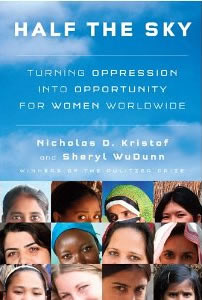Book Notes
 Nicholas D. Kristof and Sheryl WuDunn, Half the Sky; Turning Oppression Into Opportunity for Women Worldwide (New York: Knopf, 2009), 294pp.
Nicholas D. Kristof and Sheryl WuDunn, Half the Sky; Turning Oppression Into Opportunity for Women Worldwide (New York: Knopf, 2009), 294pp.
Nicholas Kristof, columnist for the New York Times, and his wife Sheryl WuDunn were the first married couple to win a Pulitzer Prize (for their coverage of democracy in China and the Tiananmen Square protests). Kristof won a second Pulitzer for his coverage of the Darfur genocide. Their newest book might be their best yet. It's more comprehensive in scope and treats what might be the most important human rights issue of the day, "gendercide" or the systematic oppression of women and girls in the developing world.
"Gendercide" takes many forms, and Kristof and WuDunn have witnessed most of them up close and personal rather than at a safe distance. They've trekked to isolated Chinese villages with no roads or electricity, they've gone undercover to interview girls in Cambodian brothels, and sat under trees in remote Burundi to listen attentively to the stories of women. This book focuses on three major areas — "sex trafficking and forced prostitution; gender based violence, including honor killings and mass rape; and maternal mortality." Much of the book makes for painful reading, with graphic accounts of bride burning, female genital mutilation, sexual selective abortions, foot binding, female infanticide, and interviews with teenage girls who work as prostitutes seven days a week, fifteen hours a day.
For all that, this is a remarkably positive and inspirational book, for its ultimate focus is on empowerment and not only exploitation. From start to finish there are dozens of stories about people and organizations, large and small, that have made radical changes for the good all around the world. Schools, hospitals, micro-finance programs, and programs to end deeply enculturated practices like female genital mutilation all demonstrate how change is possible. Kristof and WuDunn thus hope to "recruit you to join an incipient movement to emancipate women and fight global poverty by unlocking women's power as economic catalysts."
There's so much to love about this book. It's broad and deep in its geographical scope. The authors are sensitive to the many pitfalls of cultural imperialism, but that doesn't stop them from asking politically incorrect questions like whether Islam is misogynist. They are unusually equitable in their criticisms of partisan ideologies; in their view, for example, the religious right needs to move beyond its sanctimony, whereas the secular left has a problem with snobbery. Kristof and WuDunn know the literature on development economics and have attended the NGO conventions, but they've also jettisoned the air-conditioned SUV to learn from real people on the ground. I especially appreciated their wariness about exaggerated claims of miracle programs and plans; they have a healthy sense of skepticism and a high regard for the complexity of the problems. They base their appeal on both economic self-interest and especially ethical principle. Finally, their last few chapters are intensely practical, concluding with "Four Steps You Can Take in the Next Ten Minutes," and then an appendix with 45 organizations that support women's causes.


